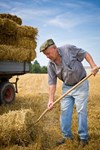Posted 4/16/2010
by Crystal Stewart

June 6-8, 2010
Houghton College, 1 Willard Avenue, Houghton NY 14744
The 2010 New York State Maple Tour will be hosted by Houghton College in the scenic hills of Allegany County. The tour will begin with registration at 3:00 pm, trade show opening at 3:30 pm and tour social from 6:00 to 8:00 pm on Sunday June 6. On Monday June 7th breakfast will be served in the Campus Center from 6:30 to 8:00 am and then we will be loading the busses for touring the following sugarhouses, the Cheese Museum and the Cuba Cheese Shoppe. Download the full details.
Posted 4/12/2010
by Jennifer Martin

An international team of scientists funded by USDA’s National Institute of Food and Agriculture (NIFA) has learned remarkable things about how fungi evolve to cause disease on crop plants. This novel information will help develop new ways to protect plants from these pathogens. The team was led by researchers at USDA’s Agricultural Research Service, the Broad Institute and the University of Amsterdam in the Netherlands. Their results were reported in the March 18 issue of the journal, Nature.
The researchers unlocked genetic secrets of the plant pathogenic fungi in Fusarium oxysporum, which causes a variety of diseases in economically important crops. Some of the fungi within this species cause disease on bananas, while others infect tomatoes, canola, melons or cotton. Not only do these fungi cause plant diseases that decrease crop productivity, they also produce toxins that threaten the health of animals that eat the infected plants.
Posted 4/9/2010
by Krishna Ramanujan for the Cornell Chronicle Online

Most studies of food webs look at how predators at the top of the food chain control prey and plant populations below them. But a new Cornell study, published March 26 in Science, is one of the first that shows how plants at the bottom of the food chain have evolved mechanisms that influence ecosystem dynamics as well.
"The ecology and interactions of most organisms is dictated by their evolutionary history," said Anurag Agrawal, associate professor of ecology and evolutionary biology (EEB), the study's senior author.
In food webs, predators help suppress populations of prey by eating them; that frees species lower in the food chain, such as plants, to flourish, a dynamic called a "trophic cascade." Most trophic cascade studies have focused on the ability of predators to increase plant biomass by eating herbivores. Such studies typically find strong trophic cascades in aquatic environments, where big fish eat minnows, which eat the tiny algae-eating crustaceans called daphnia.
Posted 4/7/2010
by Cornell Chronicle Online

As of March 29, Cornell Dining began serving local, natural beef, initially using three head of cattle per week that are raised at the Cornell Research Farms in Dryden, N.Y. That equates to about 1,000 pounds of ground beef, along with 128 pounds of rib section, 108 pounds of short loin and 120 pounds of sirloin.
"This new program drastically reduces the food miles and carbon footprint Cornell Dining was experiencing under its former beef program," said Gail Finan, director of Cornell Dining.
The local beef program was started in cooperation with Cornell Cooperative Extension of Tompkins County and the Department of Animal Science, through funding from the New York State Farm Viability Institute.
Posted 4/2/2010
by Laura McDermott

On Tuesday, April 20th, the Cornell Cooperative Extension Capital District Vegetable and Small Fruit Program along with NYS Integrated Pest Management will host a workshop on using beneficial insects in high tunnel production systems. This meeting will provide commercial vegetable growers a hands-on opportunity to see how these insects are delivered to their farm, what types of environment favor the insects and explore the costs and benefits of using them as a pest control alternative.
The 10:00am meeting is hosted by Kilpatrick Family Farm in Middle Granville NY. The program is limited to commercial growers and you must pre-register to attend. The cost is $10/person. There will be 2 DEC credits available. For more information about this program and the larger educational opportunities offered by the Capital District Vegetable and Small Fruit program, please contact Laura McDermott at 518-746-2562.
Posted 4/2/2010
by Karen Kosinski

According to a posting on the New York Farm Bureau website, farmers in New York are being asked to tell their stories. The New York Farm Bureau Foundation for Agricultural Education is working on collecting short personal stories to be included in a collection they will name "A Day in the Life of a Farmer."
Farmers are asked to provide a one-page story that focuses on a personal experience connected to agriculture or that tells about a day in the life of a farmer. The purpose of the project is to raise awareness about farming by painting a picture through the written word.
Stories should be submitted by August 15th. The foundation's web site, www.nyfbfoundation.org offers guidelines to writers.
Posted 3/25/2010
by Curt Petzoldt, Contact for IPM Program
New York State Agriculture Commissioner Patrick Hooker today announced the availability of nine new organic production guides for farmers. The new guides provide information for farmers on how to produce certified organic apples, blueberries, grapes, lettuce, potatoes, spinach, strawberries and cole crops, including cabbage, cauliflower, broccoli and Brussels sprouts. There is also a new guide to help control dairy cattle related pests using organic IPM methods.
"Farmers indicated to us that there was a lack of clear, research-based information available to help them transition from conventional to organic production," the Commissioner said. "These free guides are in direct response to those pleas and we hope they serve the farmers interested in transitioning by providing practical and proven information to make the transition as smooth and possible."
Posted 3/25/2010
by Marilyn J. Smoth
With pruning season upon us, NYS Farm Bureau reminds us of the Department of Environmental Conservation’s open burning regulations that changed in the fall. While this change allows the burning of many agricultural waste components for disposal, it would still prohibit the burning of plastic in the state.
Posted 3/22/2010
by Karen Kosinski

This weekend, March 27 & 28, is the last weekend of New York State’s Maple Producers Association and you can participate at 3 maple producers in our area!
The goal of Maple Weekend is to share the taste of real, mouth-watering maple syrup with the public and to demonstrate how it is made. Maple Weekend is a statewide showcase of production of maple products. Demonstrations of tapping, collecting, and boiling the sap are often featured.
According to the USDA’s National Agricultural Statistics Service, only Vermont and Maine surpass New York in production of maple syrup.
For producer locations in your area, check www.mapleweekend.com. Be sure to check with individual producers for specific dates and times.
Posted 3/16/2010
by Crystal Stewart via Northeast Recycling Council, Inc.
FREE Compost Marketing Workshop/Field Days: Whether selling compost is your primary business or a side business, these workshops are for you! The workshops will provide marketing insights and sales techniques, including technical information on compost applications and benefits, feedstocks, quality standards, and marketing principles. Learn how to develop a marketing plan for your compost operation, how to position your product, the ins-and-outs of compost market segments, bulk sales vs. bagged, distribution strategies, and making money on tipping fees. Sales strategies will also be covered, including sales points, using social media and new media techniques, branding, and customer education tips.









